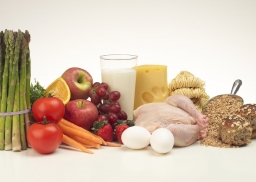Nutritional demands for adolescent athletes
Thursday, December 11, 2014 - 10:00

Good nutrition for adolescents is essential for promoting proper growth and development and is even more important with the demanding training schedules of a young athlete. The Canadian Food Guide provides excellent nutritional information for teenagers aged between 12 and 18 years who participate in general physical activity. For teens that train at high intensities and compete on competitive sports programs, the additional energy demands and fluid loss may require nutritional intake beyond what is recommended.
Energy
Energy requirements for adolescents should meet their needs for growth and development while supporting their sports participation. Eating large healthy meals and regular snacks should accommodate for the demands necessary to train and compete at their best.
Micronutrients are recommended as they help provide energy and fuel the body for optimum performance. The three micronutrients are:
- Carbohydrates – They are an efficient source of energy that the body can easily use. They are stored as glycogen in the liver and muscles for later use especially in endurance activities. Carbohydrates can be found in starches (such as grains and potatoes), yoghurt, fruit and milk.
- Proteins – They are used to build, maintain and repair muscles after an intense activity. Protein is used for muscle growth and making red and white blood cells. Protein can be found in meat, fish, poultry, cheese, milk, legumes and nuts.
- Fats - They provide a concentrated source of energy and essential fatty acids, such as omega-3 fats, that the body needs and cannot make. They help with the absorption of vitamin A, D, E and K and carotenoids. It’s best to use unsaturated fats such as olive oil, nuts and avocados as they decrease the risk of developing heart disease.
Consuming enough fluid is important before, during and after intense activities. Staying hydrated maintains muscle function and performance. Water is an excellent choice to replace fluids especially in low intensity and short duration sports. With prolonged bouts of exercise lasting 60 minutes or longer, sports drinks can be used to replace electrolytes such as sodium or potassium.
Teaching about proper nutrition and fluid intake can help teens form a positive relationship as well as emphasizing the importance of fluid. Nutrition education for adolescents should focus on long-term development as well as the benefits it can have on health, recovery and sports performance. For more information on the importance of nutrition for active adolescents, it’s recommended that you consult a sport dietitian.
References from the SIRC Collection:
1. AERENHOUTS D, DERIEMAEKER P, HEBBELINCK M, CLARYS P. Energy and macronutrient intake in adolescent sprint athletes: A follow-up study. Journal Of Sports Sciences. January 2011;29(1):73-82.
2. Aerenhouts D, Hebbelinck M, Poortmans J, Clarys P. Nutritional Habits of Flemish Adolescent Sprint Athletes. International Journal Of Sport Nutrition & Exercise Metabolism. October 2008;18(5):509-523.
3. Kennedy-Hagan K. Fit Kids: A Practical Guide to Raising Active and Healthy Children -- From Birth to Teens. Journal Of Nutrition Education & Behavior. November 2005;37(6):330.
4. Peralez J. Food Facts for Teenagers: A Guide to Good Nutrition for Teens and Preteens, 2nd Edition (Book). Journal Of Nutrition Education & Behavior. January 2004;36(1):48-49.
5. Schenkel T, Stockman N, Brown J, Duncan A. Evaluation of Energy, Nutrient and Dietary Fiber Intakes of Adolescent Males. Journal Of The American College Of Nutrition. June 2007;26(3):264-271.
Comments
Jim Glover ChPC replied on Permalink
Hello: I am wondering HOW MUCH protein should an athlete get per day? Many years ago, when I completed the level 4 NCCP Nutrition module, it was suggested to use 1.5 gr./kilograms of body weight. These days I am seeing Body Builders publishing that they are using 4- 4.8 gr./kilograms of body weight.What do yo think?
Thanks,
Jim
Joshua Karanja replied on Permalink
Hello Jim:
According to the Academy of Nutrition and Dietetics they recommend that athletes consume roughly about 1.2 to 1.7 g/kg of body weight. On the subject of high protein and body building, a study published in the journal of the international society of sports nutrition concluded that high protein consumption of 4.4g/kg of body weight during resistance training did not have an effect on body composition.
The following links can further explain on the subject.
Academy of Nutrition and Dietetics - http://www.eatright.org/Public/content.aspx?id=6442477918
Journal of the International Society of Sports Nutrition - http://www.jissn.com/content/11/1/19#B12
Australian Sport Commision - http://www.ausport.gov.au/ais/nutrition/factsheets/basics/protein_-_how_much
Johng26 replied on Permalink
I think you have remarked some very interesting points , appreciate it for the post.